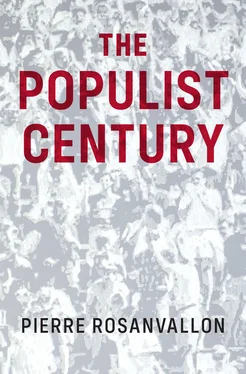This way of grasping democracy has been translated more broadly in populist regimes by the imposition of constraints on – or even the suppression of – independent authorities, the most striking manifestation of which has been the reduced jurisdiction of constitutional courts. At the very heart of the European Union, the adoption in 2011 of the new Hungarian Constitution caused a stir, so severely had the powers of the country’s Constitutional Court been reduced by a revision pursued and intellectually justified by supporters of Viktor Orbán. Following a different procedure, the independence of a comparable institution was seriously curtailed in Poland as well. Although these countries received vigorous critiques from the authorities in Brussels, they were not persuaded to revise their approach. On the contrary, they have defended themselves as being ardent servants of the sovereignty of the people; in their eyes, the broad mandates granted to their constitutional courts during the postcommunist transition period are no longer justified in a stabilized democracy in which the people have become truly sovereign. Similar processes have been followed in Bolivia and Venezuela, and also in Turkey and Russia (let us note that in Russia the notion of “sovereign democracy” has been foregrounded to characterize this mechanism of polarization 9).
Immediate expression by the people
Finally, an implicit vision of the self-evidence of the general will is embedded in the populist perspective, once victory over the enemies of the people has been won. This is in keeping with the political philosophy of Carl Schmitt, 10for whom the celebration of popular acclamation as the perfected form of democracy went hand in hand with a critique of the illusions associated with the pluralism of the liberal parliamentary approach. For Schmitt, the people that was constituted in the fight against its enemies was necessarily homogeneous and unanimous. Without borrowing his ethnic conception of homogeneity, his “populist readers” – Chantal Mouffe and Ernesto Laclau among them – have retained his idea of unanimity as the regulatory horizon of democratic expression, with all that this implies in terms of rejecting theories of argumentation and deliberation. 11In this framework, political participation does not define an active citizenry based on the formulation of personal opinions and confrontation between opposing viewpoints; it refers rather to the phenomenon of proving oneself as a member of a community. 12It is a form of Rousseauism grafted onto an a priori assumption of the virtues and potentialities of popular spontaneity, of the good sense of the masses. “All individuals are subject to error and seduction, but not the people, which possesses to an eminent degree . . . consciousness of its own good and the measure of its independence. Because of this its judgment is pure, its will is strong, and none can corrupt or even threaten it.” 13This vision would seem to have been borrowed directly from the passages in Rousseau’s Social Contract deeming that the general will could not err.
An immediate democracy of this sort thus does not require the structuring of political organizations that operate on the basis of an internal democracy; it calls rather for acts of adherence to already-constituted political propositions. An internal democracy would in fact imply the existence of tendencies, debates over strategy, competition among individuals: this is how parties are typically structured. Conversely, a political movement in the image of “the people as one body,” of which it seeks to be both the midwife and the revealer, can only form a coherent and cemented ensemble. This is why populist movements are in phase with the new world of social networks in which a category of followers has arisen; the term characterizes a type of bond among individuals and implies a pole from which initiatives emanate.
The critique of the media that is at the heart of populist rhetoric must be understood and measured by the yardstick of this principle of immediacy. The insults of a Trump addressed to journalists, the vituperations of an Orbán against the henchmen of George Soros, or the calls of a Mélenchon to a “legitimate and healthy hatred of the media” do not stem from simple fits of pique. While they may well translate exasperation and rancor in the face of contrary forces, they share more deeply in a theory of immediate democracy that deems it structurally illegitimate for intermediary bodies – of which the press constitutes a major instance – to presume to play an active role in animating public life and in constituting public opinion. For them, the media are impediments to the expression of the general will rather than necessary contributors to its formation. Viewed through a prism presupposing democratic spontaneity, the media can be regarded as functionally illegitimate and morally illegitimate as well, given their presumed dependency on private interests and the power of money.
1 1 Chantal Mouffe, The Democratic Paradox (London: Verso, 2000), p. 5.
2 2 Jean-Marie Le Pen, “Pour une vraie révolution française,” National Hebdo, September 26, 1985. Le Pen was marking his difference from the Maurrassian counter-revolutionary extreme right that jeered at the idea of democracy. His article also marked a turning point with respect to his own previous skepticism about “Churchillian democracy”: see his earlier manifesto, Les Français d’abord (Paris: Carrère-Lafon, 1984).
3 3 Le Pen, “Pour une vraie révolution française.”
4 4 See chapter 4, “Rendre le pouvoir au peuple,” in the programmatic text Le grand changement, with a preface by Jean-Marie Le Pen: Marcos-Antonio Cantolla-Iradi, Le grand changement: Et si on essayait le Front national? (Saint-Cloud: Front National, 1997).
5 5 See for example Yvan Blot, Les racines de la liberté (Paris: Albin Michel, 1985), chapter 8, “Le modèle Suisse,” and chapter 9, “Le recours: La démocratie authentique”; and Yvan Blot, La démocratie directe: Une chance pour la France (Paris: Economica, 2012).
6 6 Speech delivered February 26, 2017, at the Zénith, a large concert venue in Nantes; see https://www.leparisien.fr/elections/presidentielle/presidentielle-meeting-de-marine-le-pen-sous-tension-a-nantes-26-02-2017-6713349.php. At the time, Marine Le Pen was the target of several judicial investigations into the operations of her party, the Front National, focusing on the fact that individuals working for her within the party had been remunerated by the European Parliament.
7 7 See the emblematic article by Alain de Benoist, “Vers une juridictature,” Éléments, no. 178 (May–June 2019). In the same issue, see also the dossier titled “Les juges contre la démocratie: Pour en finir avec la dictature du droit”: https://www.breizh-info.com/2019/05/16/119033/les-juges-contre-la-democratie-elements-n-178/.
8 8 On this point, see my discussion in “The Election of Judges: Some Historical Facts,” in Democratic Legitimacy: Impartiality, Reflexivity, Proximity, trans. Arthur Goldhammer (Princeton, NJ: Princeton University Press, [2008] 2011), pp. 155–9.
9 9 The formula comes from Vladislav Surkov, a Russian businessman and politician who played the role of organic intellectual and spin doctor for Putin in the 2000s.
10 10 Carl Schmitt (1888–1985) was one of the great German legal scholars of the twentieth century. With his well-buttressed critiques of liberalism and the parliamentary system, he championed a realist vision of politics (defined as conflict between friends and enemies) and of a racist and unanimist conception of “the people.” His evolution toward National Socialism helped discredit his thought, but he was “rediscovered” in the 1980s by a far right seeking intellectual forerunners and by a far left fascinated by his anti-liberal radicality and his cult of force.
Читать дальше












